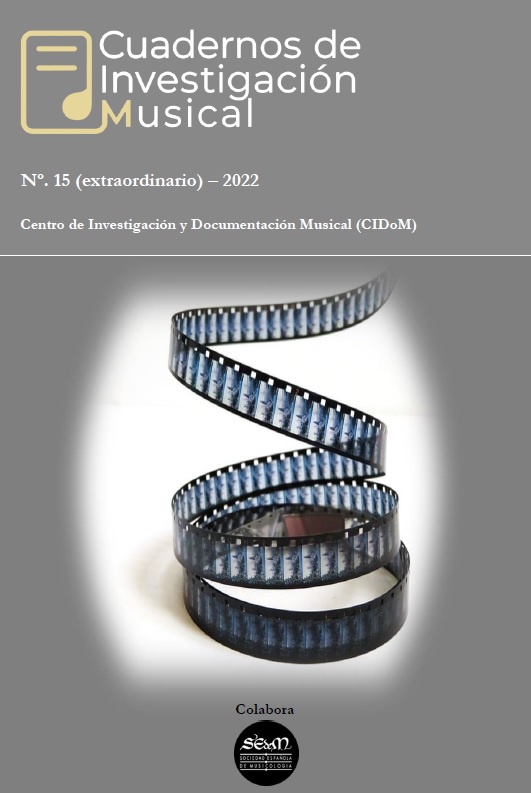Narrative Rupture and Musical Discourse in Rick and Morty An Approach to Music in Animation for Adults
Main Article Content
Abstract
Rick and Morty is an animated series for adults that was first aired on Adult Swim in 2013. The plot focuses on the adventures of a scientist, Rick Sanchez, who travels through time and space accompanied by his grandson Morty. Its originality lies in continuous narrative games based on philosophical and scientific theories that the main characters constantly allude to and mix with elements of pop culture. In this article we start from the question: How do the novelties imposed in the development of history affect musical discourse? After a historical contextualisation of the animated series, we carry out an analysis of the pre-existing music from which two main conclusions are drawn: its inclusion in the plot is fundamental for the narrative evolution; and the pre-existing song is used as a leitmotif. With this, Rick and Morty provides new visions for the creation of animated series, establishing itself as a reference within the current golden age of serialised fiction.
Article Details
Los autores de los artículos mantienen el copyright, no recibirán ninguna contraprestación económica por el trabajo y el mismo siempre será reconocido como exclusivamente suyo. La revista se compromete a proteger la integridad y originalidad del artículo, así como los derechos de autor que correspondan. Los autores son los únicos responsables del material, textos e imágenes que utilizan en sus respectivos trabajos, debiendo respetar siempre los derechos de autor de terceras personas, por lo que la revista no se hace responsable de lo contenido en este tema respecto al trabajo de los autores.
References
Ash, B., (2020). An interview with Ryan Elder, Composer of Rick And Morty. Spotlight. Available from: https://www.samash.com/spotlight/an-interview-with-ryan-elder-composer-of-rick-and-morty/
Deaville, J., (2019). Studying the study of Television Music and Sound. American Music. 37 (4), 400-418. Available from muse.jhu.edu/article/741663.
Eaton Faulkes, J. (2019) Millennial Television: The Representation of Dysfunctional Parenting in Rick and Morty (2013-) (Final Degree Project). Universitat de les Illes Balears. Palma de Mallorca.
Elder, R. [@RyanElderMusic]. (6 de septiembre de 2021). Finally the arrangement of For the Damaged: Coda otherwise known as the Evil Morty theme was composed and recorded by @BlondeRedhead themselves! Amazing stuff from a band I'm in awe of and could not have been more rewarding to work with. [Tweet]. Twitter. https://twitter.com/RyanElderMusic/status/1434911414309711876
Evans, T., (2015). Wubba Lubba Dub Dub!: The Pursuit of Happiness in Rick and Morty.” Under Construction @ Keele. 2 (1), 10-18. Available from https://view.joomag.com/under-constructionkeele-volume-2-issue-1/0077049001458827133?short&
Falvey, E. (2020) ‘Situating Netflix’s Original Adult Animation: Observing Taste Cultures and the Legacies of ‘Quality’ Television through BoJack Horseman and Big Mouth’, Animation, 15 (2), pp. 116–129. doi: 10.1177/1746847720933791.
Hilleary, M. (2017) Rick and Morty: Composer Ryan Elder on How He Writes Joke Songs. Pitchfork. Available from: https://pitchfork.com/thepitch/rick-and-morty-composer-ryan-elder-on-how-hewrites-joke-songs/.
Hue, A. (2020) Rick & Morty Season 7 Already in Development. ScreenRant. Available from: https:// screenrant.com/rick-morty-show-season-7-writing-dan-harmon/.
Koltun, K., (2018). Rick, Morty, and Absurdism: The Millennial Allure of Dark Humor. The Forum: Journal of History, 10 (1), 99-128. Available from https://digitalcommons.calpoly.edu/forum/ vol10/iss1/12
Miranda, L., (2017). The Self is Dead – Alienation and Nihilism in Rick and Morty. Class, Race and Corporate Power. 5 (3). doi: 10.25148/CRCP.5.3.006513
Mittell, J., (2015). Complex TV: The Poetics of Contemporary Television Storytelling. New York: New York University Press.
Norris, D. (2016) ”Pop Cultural Assimilation of the Lovecraftian Worldview through the Lens of Rick and Morty", Lovecraft Annual, 10 (2016), 205-09. Available from https://www.jstor.org/stable/26868521?seq=1.
Nye, S. (2011). Chapter 7. From Punk to the Musical. South Park, Music and the Cartoon Format. In James Deaville, ed. Music in Television: Channels of Listening (pp. 143-165). New York: Routledge.
Torre, T., (2016). Historia de las series. Barcelona: Editorial Roca.
